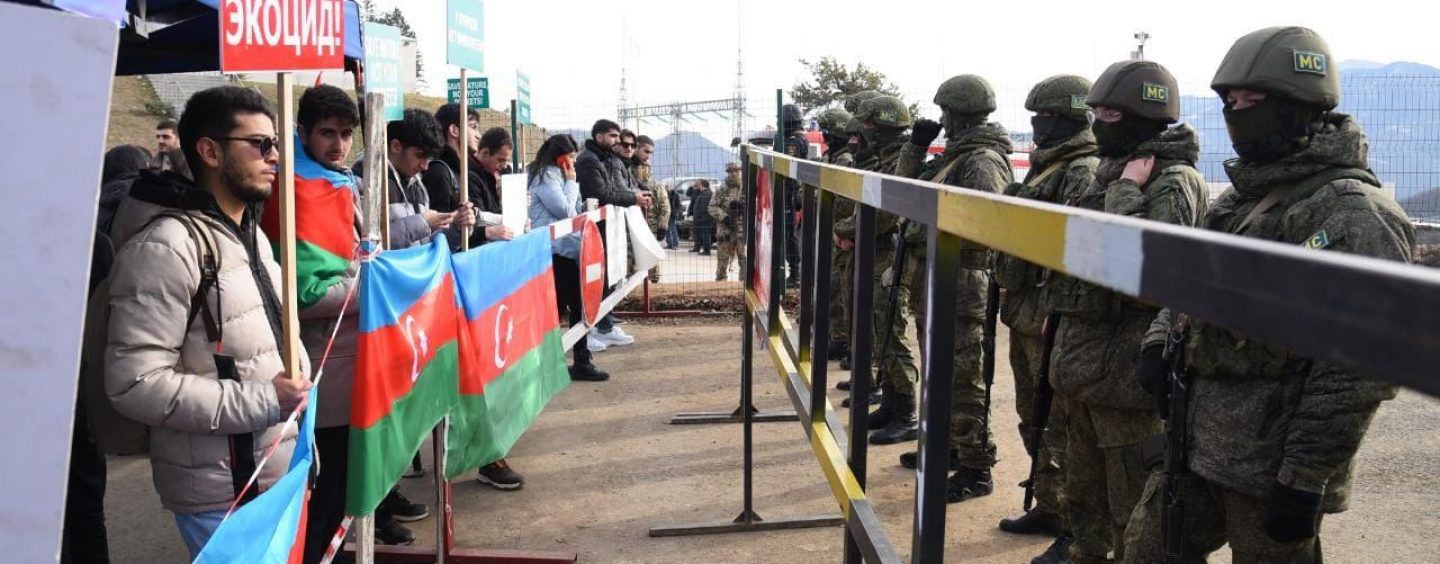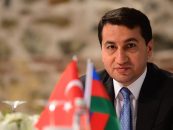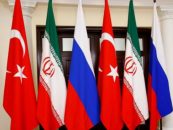By Nasimi Mammadli
For three days now, representatives of Azerbaijani NGOs, journalists and social activists have been holding a peaceful, sit-in protest on the section of the Lachin-Khankendi road near Shusha, demanding “an end to environmental terrorism in Karabakh.” The officially declared purpose of the action is to counter the illegal exploitation of mineral deposits, in particular, the “Gyzylbulag” and “Demirli” deposits in the territories under the temporary control of Russian “peacekeepers”. As a result of the action, the Lachin road leading from Khankendi to Armenia was temporarily closed by the Russian military.
For several days now, in public discussions, instead of analyzing the real reasons for what is happening on the Lachin road, a search is being made for an answer to the question whose interests this action serves. The answer to this question lies in its causes.
The analysis shows that what is happening is connected not only with environmental problems, but has deeper causes. First of all, this is due to the contradictions that have arisen in the peace process between Armenia and Azerbaijan. Armenia is looking for a reliable international guarantee of legal protection and security of the Armenians living in Karabakh. At the same time, she wants to receive an international guarantee for the de facto existence and security of the separatist regime in Karabakh.
At this stage, Armenia wants to ensure a longer stay of Russia in Karabakh as a “peacemaker”, as well as to achieve, through France, the participation of the West in the region as a “mediator”.
At the bilateral meeting of the President of Azerbaijan Ilham Aliyev and the President of Russia Vladimir Putin, held in Sochi on October 31, 2022, I. Aliyev stated that “the Karabakh conflict is already history, it was resolved two years ago. Therefore, there is practically nothing to discuss here in this context.
At the same time, the President of Azerbaijan has repeatedly stated that the mediation of any foreign country regarding the rights of the Armenian population living in Karabakh is unacceptable. This issue will not be discussed internationally. The stay of the Russian “peacekeeping” contingent in Karabakh will not be extended. Azerbaijan will definitely not agree to France’s re-entry into the negotiation process. Consequently, Azerbaijan is seriously resisting the realization of these desires of Armenia.
Another serious problem is that the Lachin road does not serve humanitarian purposes. After the signing the “Ceasefire Declaration” on November 10, the facts of the transfer of terrorists and weapons along the Lachin road to Karabakh were revealed.
The mines recently cleared in this area by Azerbaijani mine detectors were produced in Armenia in 2021. 2,700 mines discovered in the border areas and Karabakh were presented by Azerbaijan to the international community as material evidence.
At the same time, it is obvious that Iranian citizens suspected of terrorism are illegally arriving in Karabakh.
In fact, the Lachin road contributes to the disruption of the peace process between Armenia and Azerbaijan, the continuation of separatism and the commission of provocations. It is clear that this path serves not only humanitarian purposes. According to national and international legislation, as well as these facts, Azerbaijan, for the sake of peace, must introduce a new control mechanism on the Lachin road.
Finally, the most important issue is Armenia’s non-compliance with the November 10 agreement in full or an attempt to evade it under various pretexts. Points 4, 7 and 9 of the “Statements” have not yet been implemented. Armenian armed formations remain in Karabakh, internally displaced persons have not been returned, and the opening of a corridor linking the western regions of Azerbaijan with Nakhchivan is also being delayed. And even creates a threat to stability in the region by regular violations of the ceasefire.
A peaceful action on the road to Lachin is not in the interests of Russia in the first place. Because in the current conditions, Russia has faced sharp criticism in the public opinion of both Armenia and Azerbaijan. The hopes of the Armenian separatists of Karabakh in Russia are gradually crumbling. The international community can also take advantage of the crisis that Russia is facing in the South Caucasus.
Russia is currently in a stalemate. It refrains from steps that could pave the way for Western activism in the South Caucasus. At the same time, not wanting to damage normal relations with Turkey, it does not want to deepen contradictions with Azerbaijan. As the road to Lachin remains closed, Russia is further losing its military and political influence in Armenia and Karabakh.
The closure of the Lachin road due to peaceful protest during this period and its reopening thereafter strengthens Azerbaijan’s political position. It can also give a positive impetus to the peace process. And while the separatist forces living in Karabakh are still resisting, civilians are finally beginning to understand that it will not be easy to freely use the Lachin road as before.
They also understand the Russian presence in Karabakh, which is weakening due to the war in Ukraine, is temporary. This action once again caused concern and discussion in the Armenian community.
Unfortunately, the international response to the incident is inadequate and may interfere with the peace process. The position of the West expressed under the influence of Armenian propaganda strengthens Russia’s position in the South Caucasus. It would be logical for the US and EU to call on the Azerbaijani authorities to ensure freedom of movement and security along the corridor, in line with the November 10 tripartite statement, but also to point out that the corridor has deviated from humanitarian goals.
Analyzes show that the use of soft power is the most optimal way to reduce Russia’s influence in the region, neutralize Armenia and the West, and regulate future relations with the Armenians living in Karabakh.
Azerbaijan once again shows Armenia, Russia and the Western community that it intends to quickly complete the process of restoring state control over Karabakh.
All parties concerned must openly advocate for this to happen through negotiations and not a new military conflict.






